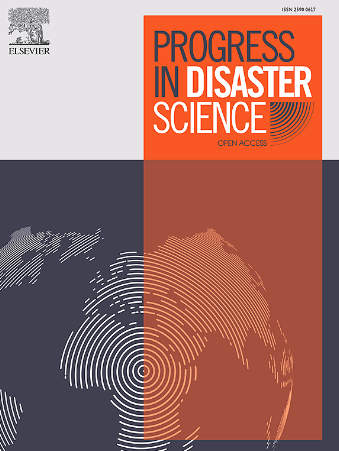Managing the post COVID-19 new normal: Redressing vulnerabilities of different occupational groups through social contract of public sector transparency and accountability
IF 3.8
Q3 ENVIRONMENTAL SCIENCES
引用次数: 0
Abstract
The COVID-19 has had a significant impact on various occupational groups in Bangladesh, disrupting their fundamental necessities and everyday activities. This study examines the governance responses to these occupational groups, focusing on transparency and accountability through the lens of the social contract theory. Unlike prior studies focused on economic impacts, this study reveals how governance failures exacerbated vulnerabilities of a critical gap in pandemic literature. By employing a mixed-methods approach, this study integrated qualitative techniques (key informant interviews and focus group discussions) with quantitative surveys to analyze both primary data collected from 355 respondents and secondary data from institutional reports and scholarly literature. A significant association was found between the pandemic's impact and occupational groups (X2(1, N = 355) =49.09, p = 0.000), highlighting job losses, reduced income, business closures, and salary deductions. A high prevalence of income dissatisfaction was observed, with 97.7 % of respondents expressing their discontent. Financial strain during different pandemic waves was evident, with t-values of 13.09 (first wave vs. pre-pandemic), −11.051 (first wave vs. second wave), and 8.073 (pre-pandemic vs. second wave), all p < 0.001. The government played a major role in providing food (p = 0.000) and health (p = 0.002) support; however, cash aid did not demonstrate statistical significance (p = 0.138). Gender inequalities were apparent in the provision of relief aid, with notable discrepancies in food assistance (p = 0.007), cash support (p < 0.001), and healthcare aid (p < 0.001). The study findings highlight the gaps in accountability and transparency in distributing support services, offering valuable insights for policymakers and researchers to enhance the resilience of impoverished populations in future crises. The study reveals novel insights into gendered aid disparities, urban-rural perception gaps, and systemic shortcomings in social safety nets during crises.
管理COVID-19后新常态:通过公共部门透明度和问责制的社会契约解决不同职业群体的脆弱性
新冠肺炎疫情对孟加拉国各职业群体产生了重大影响,扰乱了他们的基本必需品和日常活动。本研究考察了对这些职业群体的治理反应,通过社会契约理论的视角关注透明度和问责制。与以往侧重于经济影响的研究不同,本研究揭示了治理失败如何加剧了流行病文献中一个关键空白的脆弱性。通过采用混合方法,本研究将定性技术(关键信息提供者访谈和焦点小组讨论)与定量调查相结合,分析了从355名受访者收集的主要数据以及来自机构报告和学术文献的次要数据。发现大流行的影响与职业群体之间存在显著关联(X2(1, N = 355) =49.09, p = 0.000),突出表明失业、收入减少、企业关闭和工资扣减。对收入不满的比例很高,97.7%的受访者表示不满。不同大流行波期间的财政压力都很明显,t值分别为13.09(第一波vs.大流行前)、- 11.051(第一波vs.第二波)和8.073(大流行前vs.第二波),p <;0.001. 政府在提供粮食(p = 0.000)和保健(p = 0.002)支助方面发挥了主要作用;而现金援助没有统计学意义(p = 0.138)。在提供救济援助方面存在明显的性别不平等,在食品援助(p = 0.007)、现金支持(p <;0.001)和医疗援助(p <;0.001)。研究结果强调了在分配支持服务的问责制和透明度方面存在的差距,为政策制定者和研究人员提高贫困人口在未来危机中的抵御能力提供了宝贵的见解。该研究对危机期间的性别援助差距、城乡认知差距和社会安全网的系统性缺陷提出了新的见解。
本文章由计算机程序翻译,如有差异,请以英文原文为准。
求助全文
约1分钟内获得全文
求助全文
来源期刊

Progress in Disaster Science
Social Sciences-Safety Research
CiteScore
14.60
自引率
3.20%
发文量
51
审稿时长
12 weeks
期刊介绍:
Progress in Disaster Science is a Gold Open Access journal focusing on integrating research and policy in disaster research, and publishes original research papers and invited viewpoint articles on disaster risk reduction; response; emergency management and recovery.
A key part of the Journal's Publication output will see key experts invited to assess and comment on the current trends in disaster research, as well as highlight key papers.
 求助内容:
求助内容: 应助结果提醒方式:
应助结果提醒方式:


